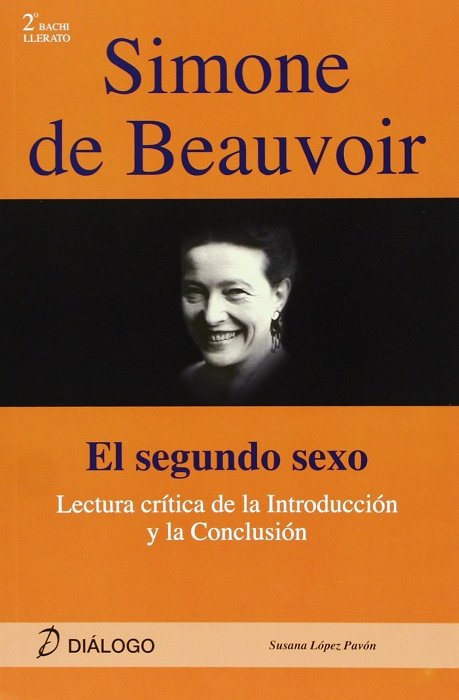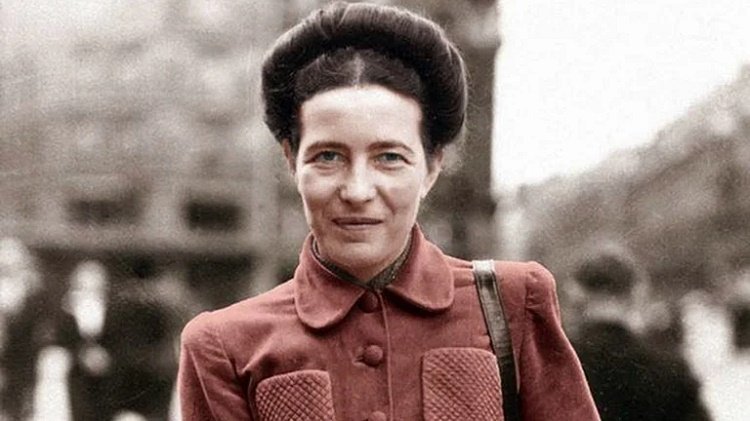Revisitar a la pensadora Simone de Beauvoir | Revisiting the thinker Simone de Beauvoir
Parece inevitable que en el tiempo se olviden ciertas figuras que han jugado un papel relevante en los procesos histórico-culturales de Occidente. A veces es el producto de la desinformación; otras veces de la celeridad de las “actualidades”, incluso de la negligencia. Ese olvido, en algunos casos, es favorable a la figura específica, pues ayuda a ver su actuación (individual o social) y su producción desde otra perspectiva; entonces puede llegar a ser comprendida más justa y apropiadamente, siendo abandonados ciertos prejuicios, contextualizados aspectos no aprobados y revalorados sus aportes.
Hago esta reflexión general al pensar en personas vinculadas al mundo intelectual; lejos todas aquellas responsables de crímenes, abusos e injusticias juzgadas y demostradas en la historia. Me vino esta reflexión (renovada, pues la he tenido desde años atrás) cuando hoy me percaté que era la fecha de la muerte de Simone de Beauvoir, ocurrida el 14 de abril de 1986.

It seems inevitable that in time certain figures that have played a relevant role in the historical-cultural processes of the West are forgotten. Sometimes it is the product of disinformation; other times of the speed of "current events", even of negligence. This oblivion, in some cases, is favorable to the specific figure, because it helps to see his performance (individual or social) and his production from another perspective; then it can be understood more fairly and appropriately, being abandoned certain prejudices, contextualized unapproved aspects and revalued his contributions.
I make this general reflection when thinking about people linked to the intellectual world; far from all those responsible for crimes, abuses and injustices judged and demonstrated in history. This reflection came to me (renewed, since I have had it for years) when today I realized that it was the date of the death of Simone de Beauvoir, which occurred on April 14, 1986.
============
Considero que Simone de Beauvoir es una de las figuras más relevantes del siglo XX en lo que se refiere al pensamiento existencial y social, particularmente el dirigido a la reflexión acerca de la mujer. Por eso hablo de “revisitarla”, a conciencia de que algunos aspectos de su pensamiento y momentos de su vida no fueron bien vistos en su época, como, por ejemplo, su inclinación comunista (con acciones políticas en su favor) y cierta anuencia (aunque fuera por omisión) de procesos ocurridos en países bajo ese régimen; o también los prejuicios alimentados por el llamado “pacto de polifidelidad” que ella y el filósofo Jean Paul Sartre acordaron, que les permitió tener “amores contingentes” fuera de su relación de pareja. Y quizás otros…
No he sido lector de toda su obra, que incluye novelas, textos autobiográficos, ensayos filosóficos, entre otros. Sí del que considero su principal y más trascendente producto como pensadora e investigadora: El segundo sexo. A él dedicaré este post, como una forma ligera de mi “revisitación”.

I consider Simone de Beauvoir to be one of the most relevant figures of the twentieth century in terms of existential and social thought, particularly in terms of reflection on women. That is why I speak of "revisiting" her, aware that some aspects of her thought and moments of her life were not well seen in her time, such as, for example, her communist inclination (with political actions in her favor) and certain acquiescence (even if by omission) of processes that occurred in countries under that regime; or also the prejudices fed by the so-called "pact of polyfidelity" that she and the philosopher Jean Paul Sartre agreed upon, which allowed them to have "contingent loves" outside their couple relationship. And perhaps others...
I have not been a reader of all her work, which includes novels, autobiographical texts, philosophical essays, among others. I have read what I consider her main and most transcendent product as a thinker and researcher: The Second Sex. I will talk about it briefly, as a light form of my "revisitation".
============
El segundo sexo, publicado en 1949, es, en mi concepto, el discernimiento intelectual mejor fundado, más sólido (por su visión total, desde el origen del matriarcado hasta los movimientos de esos años, su inmersión en las implicaciones culturales, psicológicas, etc.) acerca del complejo asunto de la mujer, que logró despertar e impulsar de modo definitivo la reflexión y el debate al respecto de esta esencial cuestión. En su momento generó mucha polémica y luego se convirtió en la referencia obligada de todos los que trataran ese asunto central, pero, más aún, en la base de reimpulso del movimiento feminista, que, a mi modo de ver, ha sido uno de los mayores avances socio-culturales en la modernidad, apartando posibles discrepancias.
No es mi intención presentar aquí una visión de este extenso trabajo (dos volúmenes); solo ofrecer unas citas tomadas de su segundo tomo: “La experiencia vivida”, que podrían servir para ilustrar e incentivar la recomendación de “volver” a esa obra.
A continuación unas pocas citas:
Los momentos que las mujeres consideran reveladores son aquellos en los que descubren su acuerdo con una realidad que reposa en paz sobre-sí-misma: son esos momentos de dicha luminosa que Virginia Woolf –en Mrs. Dolloway, en Al faro–y Katherine Mansfield a lo largo de toda su obra acuerdan como suprema recompensa a sus heroínas.
(…) en la colectividad humana nada es natural y (…) la mujer es uno de los tantos productos elaborados por la civilización. (…) La mujer no es determinada por sus hormonas, ni por instintos misteriosos, sino por la forma en que recupera, (…), su cuerpo y su relación con el mundo.
En los dos sexos se realiza el mismo drama de la carne y del espíritu, de la finitud y la trascendencia. Los dos son roídos por el tiempo y asechados por la muerte, tienen una misma necesidad esencial del otro, y pueden extraer de su libertad la misma gloria. Si la supiesen gustar, no se verían tentados a disputar falaces privilegios y la fraternidad podría entonces nacer entre ellos.
Dejo a ustedes, apreciados lectores, su interpretación.

The Second Sex, published in 1949, is, in my opinion, the most well-founded intellectual insight (due to its total vision, from the origin of matriarchy to the movements of those years, its immersion in the cultural and psychological implications, etc.) on the complex issue of women, which managed to awaken and definitively promote reflection and debate on this essential question. At the time it generated much controversy and then became the obligatory reference for all those who dealt with this central issue, but, even more so, it became the basis for the revival of the feminist movement, which, in my opinion, has been one of the greatest socio-cultural advances in modernity, leaving aside possible discrepancies.
It is not my intention to present here an overview of this extensive work (two volumes); only to dwell on a few quotes taken from its second volume: "The lived experience", which could serve to illustrate and encourage the recommendation to "return" to that work (even if you have not read it).
Here are a few quotes:
The moments that women consider revelatory are those in which they discover their agreement with a reality that rests in peace about-itself: they are those moments of luminous bliss that Virginia Woolf-in Mrs. Dolloway, in To the Lighthouse-and Katherine Mansfield throughout her work accord as supreme reward to their heroines.
(...) in the human community nothing is natural and (...) woman is one of the many products elaborated by civilization. (...) Woman is not determined by her hormones, nor by mysterious instincts, but by the way she recovers, (...), her body and her relationship with the world.
In the sexes the same drama of flesh and spirit, of finitude and transcendence, is played out. Both are gnawed by time and haunted by death, have the same essential need of the other, and can extract from their freedom the same glory. If they knew how to taste it, they would not be tempted to dispute fallacious privileges and fraternity could then be born between them.
I leave to you, dear readers, their interpretation.
Referencias | References:
De Beauvoir, Simon (1975). El segundo sexo (vol. II). Arentina: Ediciones Siglo Veinte.
https://es.wikipedia.org/wiki/Simone_de_Beauvoir
https://en.wikipedia.org/wiki/Simone_de_Beauvoir
https://es.wikipedia.org/wiki/El_segundo_sexo
https://en.wikipedia.org/wiki/The_Second_Sex
https://www.bloghemia.com/2018/12/simone-de-beauvoir-el-segundo-sexo-pdf.html

Gracias por su lectura | Thank you for reading.



Grandioso!! Me encanta que nos presenten a mujeres como esta!!! GRACIAS!!!!
Gracias por tu visita y tu generoso comentario, @caracasprin.
Hola! 🙋♂️
Muchas gracias por tu aporte. Muy bueno! 👏👏
En mi caso ha sido visita, porque no la conocía, jeje
En recompensa a tu trabajo, has recibido un voto del trail de curación de la comunidad EfectiVida. 🏅
En EfectiVida hablamos sobre el maravilloso mundo de la efectividad y el desarrollo personal. ✅
Si quieres colaborar con nosotros, sería un honor para la comunidad. Puedes hacerlo de las siguientes maneras:
Puedes ver más sobre la comunidad en el post de bienvenida.
Estamos comenzando, así que toda ayuda viene bien. 🙏
¡Muchas gracias! Recibe un cordial saludo! 👋
Gracias, @efectivida.
Esta publicación ha recibido el voto de Literatos, la comunidad de literatura en español en Hive y ha sido compartido en el blog de nuestra cuenta.
¿Quieres contribuir a engrandecer este proyecto? ¡Haz clic aquí y entérate cómo!
https://twitter.com/jorma08/status/1514799989863591953
The rewards earned on this comment will go directly to the person sharing the post on Twitter as long as they are registered with @poshtoken. Sign up at https://hiveposh.com.